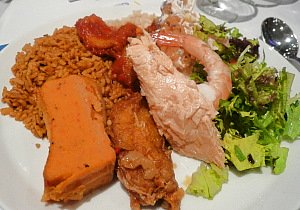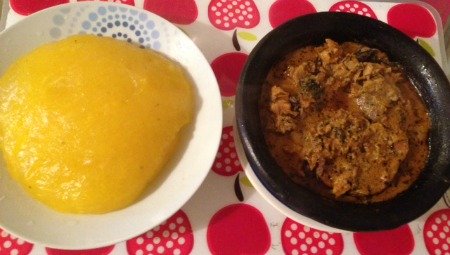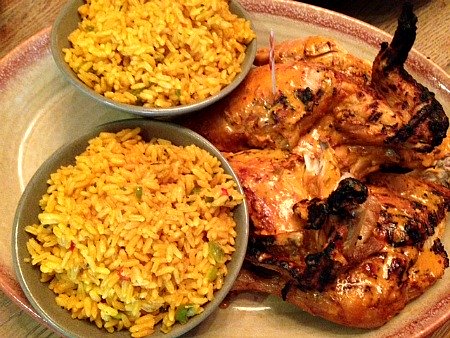About African Food
What Do Africans Eat?
Traditional Africa food is organic plant-based with little meat, and fish often added for flavour. These are unrefined natural food. Processed food is unknown to many on the continent.
Most are gluten-free, unrefined natural foods, including whole grains, legumes, roots and tubers and a variety of fruits, seeds, nuts and vegetables. These plant-based food are usually the focal point of almost every meal and not meat, fish or poultry.
Popular foods are cassava, yam, cocoyam, rice, beans, maize, sorghum, millet, groundnut, coconut, plantain, melons, seafood, poultry, beef, goat meat, bush meat, palm oil, potatoes, lentil, vegetables, vegetable oils, and a wide selection of herbs and spices.
And for desserts? Fruits like mangoes, pawpaw, bananas. Oranges, pineapple, watermelon and a host of others serve as snacks and desserts.
African Food Facts
African foods are mainly starch based, with generous amount of vegetables and fresh or roasted fish or meat. This means that they are devoid of refined sugars and excess food additives and rich in bulk and fibre. Again, 90% or more of African foods are organic.
These foods are often grown behind the house at subsistence level, helped by the beautiful tropical weather, which means that different varieties of vegetables, fruits, cereals, tubers, nuts, and grains are grown all year round.
Fish, milk, meat from poultry or cow, goat, lamb, or game ("bush meat") as well as other sea foods provide their animal protein in all African communities.
Whether in the bushy savannas, typical rain forest, or coastal riverine settlements, access to such primary source of protein is not in short supply in stable traditional African setting.
There is simply no where in African you would not find farmers, hunters, herdsmen or fishermen...from Yaounde, Sapele, Lagos to Port Alexandria.
The African Food History
The authentic African food history has been described by both African and Western early writers with immense elegance. Africans have always given serious attention to what they eat. All African societies are replete with a long list of original and adapted cuisines that reflect their historic interactions and cultures.
Olaudah Equiano, a.k.a Gustavus Vassa (1745 – 31 March 1797),
one of the earliest black African writers in the United Kingdom,
testified in his narrative, that the traditional African food is "free
from refinements in cookery which debauch the taste".
He
was captured and taken to America as a slave at 11 years of age, from
what now came to be known as Nigeria, and later bought his freedom for
£40.00.
Contrary to what some want the world to belief, the very balanced style of cooking seen in many African communities today has been indigenous to Africa thousands of years even before the slave trade, or even before the incursion of Arabian tradesmen into that continent.
The narrative of Olaudah Equiano (Gustavus Vassa the African), as well as the same preserved manner of cooking still seen in newly found African societies testifies to this fact.
Where ever they went, Africans took along with them their cooking. Thus today, all over the world, Africans still cook alike with some little variations.
Like their Asian counterparts, most cuisines of Africa are quite spicy, prepared with very hot chillies a common trend in most hot countries.
In the West Indies, the afro-Caribbean food is thus not a great deviation from traditional African dishes.
In North America, the African American foods are now generally referred to as soul food. Soul food was thus new to America, but not to the Africans who brought with them the ideas, despite been deprived of the proper ingredients with which to prepare these meals.
Thankfully, soul food is now very popular, and eaten all over black communities in America.
Popular African Food You Should Try.
- Jollof rice is said to be one of the best from Africa. Super easy to make with all ingredients available everywhere. Try our recipe here.
- Piripiri chicken and sauce served on a bed of rice or potatoes. Alternatively, dip any bread of your choice in the sauce. This very spicy dish from Angola will certainly impress spicey food lovers everywhere.
- Morrocan chicken or vegetable tajine. The dish is named after the pot use in cooking, The tajine is a round pot with a con-shaped pot. The stew is slowly cooked with various spices.
- Shakshuka is a healthy breakfast from North Africa very filling and easy to make. Try it here.
- Waakye and shitor sauce. Beans and rice dish from Ghana. Highly nutritious and well rated. Try recipe here.
- Sukuma Wiki is a sauce made dark leafy vegetables like kale or collards green and indigenous to Kenyan. Serve this with any fufu of choice with a moderate amount of grilled meat like Nyama Choma another Kenyan favourite.
- Chakalaka a spicey tomato bean stew that is flavourful and give your usual baked beans a pleasant satisfying twist. Try it here.
- Atieke and Griiled fish. Atieke is made from cassava and has similar texture to couscous. It is easy to make and you can find it in African food stores around you. Grill your fish with pepper, a little salt and add any herb of choice serve with spicey tomato sauce.
- Egusi soup is a delicious sauce from West Africa. You serve this with eba, pounded yam or banku. Get recipe.
- Nigerian honey beans in tomato sauce. Highly proteinous and suitable for vegetarians and vegans, low carb. Try recipe or here.
Where To Buy African Food?
African food is becoming very popular and not so difficult to find in big cities with a large population of Africans living abroad. Check online for stores near you. Some grocery stalls now carry yams, cassava, plantains, egusi and palm oil. So check your local grocery stores as well. And in the likelihood that you can't find what you want, email us for alternatives at info@africanfoods.co.uk.
Breakfast In Africa
Breakfast is sacrosanct in Africa. It is a meal taken very early in the morning. In farming communities, breakfast is obviously so important to provide energy for the work ahead. Breakfast is often light and could vary greatly, depending on the part of the continent as well as the culture.
The typical African Breakfast could be:
|
|
Lunch
Lunch is eaten at any time from mid day to 4pm. It is often the heaviest meal of the day.
Lunch in Africa is easily prepared from any of the main staples, depending on the part of the continent you are in.
Most African lunch menus are made from rice, cassava, millet, sorghum, yam, plantain, beans, or potatoes. They are made into fufu (much like mashed potato) or boiled and served with one of the numerous African stews or soups. A ready example would include:
- Cassava products like Gari akpu or starch (usin served with vegetable soup or banga soup or egusi soup or Ofe Onubu.
- Pounded yam or semolina or ground rice (tuwo shinkafa) or corn meal (tuwo masara) or amala made from elubo served with any of the above soups or ewedu or abula or gbegiri soup in the south of Nigeria, or Miyan kuka or Miyan kabewa.
- Jollof rice served with moimoi and fried plantain (see picture above)
- Nshima served with red beans, fresh fish, and vegetable souce
- Koshari
- Ugali served with vegetable soup
Lunch is usually served with a wide variety of African dessert, including fermented goat milk (yogurt), assorted fresh tropical fruits, traditional African drinks (sobo drink for example).
As in most hot climates, Lunch is followed by an afternoon nap for an hour or so, if condition allows, before going back to work or farm.
Supper or Dinner
Hmm. What is it for dinner? You can be guaranteed that you would be spoil for choice. Supper is eaten any time from 5pm to 10pm.
Africa is a very fertile continent with a huge variety of food crop and fauna. During peace time, and with good rainfall, most communities are able to feed themselves just by farming at subsistence level - by means of small farms at the back of their homes or medium sized farms not far away from home.
On the way back from farm, dinner could be a combination of:
|
|
... and more and more.
What Other Visitors Have Said
Click below to see contributions from other visitors to this page...
Chicken in Groundnut Sauce Not rated yet
The first time I had chicken in groundnut sauce was 30 years ago when I attended college in Philadelphia. The chef at my school was from Nigeria. She …
Want regular updates on African cuisines and food recipes? What about unique health information about these foods - what to eat and avoid to keep healthy from the list of African recipes available?
Fill in the form below to subscribe to our Newsletter - AfricanFoods Weekly?
Worried about spamming? We are too. We will never ever give or pass on your information to anyone else. We will only use your email address to send you your copy of our weekly newsletter. We do have a zero tolerance to spam. We subscribe to a very strict policy on the handling and use of information we gather on this site! We also get paid for affiliate links on this site. See our privacy policy for further details.
Follow us on social media:
Get Our Weekly Newsletter. Subscribe Today. It's FREE.
Subscribe to African Foods Weekly
Get African food recipes, cooking tips, and healthy eating info delivered to your inbox every week. Simply fill in your email below and click SUBSCRIBE .
(Your information will not be shared)













New! Comments
Have your say about what you just read! Leave me a comment in the box below.